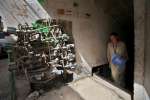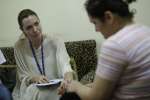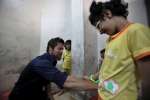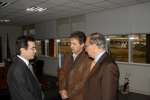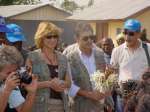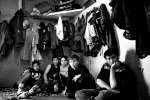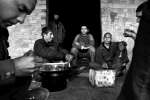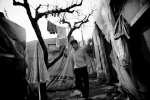UNHCR says most of Syrians arriving in Greece are students
News Stories, 8 December 2015
GENEVA, Dec 8, (UNHCR) – The Mediterranean crossing is treacherous, the risk of drowning is constant. But still they come, day after day, in a fleet of dinghies spilling them onto the shores of Greek Islands near Turkey, almost 800,000 so far in 2015 alone.
Most are fleeing the conflict in Syria. Educationally, they are the flower of their country: 86 per cent say they have secondary school or university education. Half of that group had studied at university.
But they carry the wounds of war with them. One in five is still searching for a family member missing in Syria.
These are some of the results of a survey, released by UNHCR in Geneva today (December 8) and available here. It draws on interviews carried out by UNHCR border protection teams in various locations in Greece along the Greek-Turkish border. In all 1,245 Syrians were interviewed between April and September 2015.
The vast majority of those surveyed (78 per cent) were under 35.
The most frequently mentioned occupation of those questioned was student: 16 per cent of those questioned said they were studying before they fled. That was followed by: merchants – nine per cent; carpenters, electricians, plumbers – seven per cent; engineers, architects – five per cent; doctors or pharmacists – four per cent.
Overall, the profile is of a highly-skilled population on the move.
Almost two-thirds of those surveyed – 63 per cent – said they left Syria in 2015. And some 85 per cent said they reached one of the Greek islands on their first attempt. Most of those who answered the questionnaire, 65 per cent, said they had no special needs. Some five per cent said they had been tortured.
The majority had spent less than three months in a third country before crossing the Mediterranean. Very few, just 13 per cent, had the necessary documents to stay in a third country. Among these people, an overwhelming 91 per cent of those who lived in a third country for more than a month stayed in private accommodation. Only a handful, just three per cent, had been lodged in camps.
The main reasons offered for leaving a third country and crossing the Mediterranean were the difficulties of finding work and fears about security.
"This survey is the first in a series of assessments UNHCR is conducting to understand who these refugees are, where they come from, what they've been through," said Diane Goodman, deputy head of UNHCR's Europe bureau. "It is only when governments, UNHCR and partners have this information that we can truly meet the assistance and protection needs of these families."
Of those questioned, some 58 per cent said their intention was to try to bring other family members later to their country of asylum.
As the conflict in Syria approaches the fifth anniversary of its outbreak most of those landing on European shores said they were hoping to obtain asylum in Germany. The next European country on the list was Sweden. The main reasons the interviewees gave were: family reunification, assistance for refugees, employment possibilities and educational opportunities.
"Syrians risk their lives and the lives of their children to try to make it to Europe in the search for educational and employment opportunities, for the chance to live in security and peace," Goodman said. "And yet, there could be legal ways of coming to Europe – through family reunification, student or work visas, private sponsorship or more resettlement places – that would be safer, more regulated and infinitely more humane."
The UNHCR survey is not representative of the whole Syrian refugee population arriving in Greece. The methodology was not a random sampling.
But the analysis does give a good overall picture of the 'profile' of Syrians arriving in Greece between April and September 2015.
A video report on the survey's findings can be seen here.





